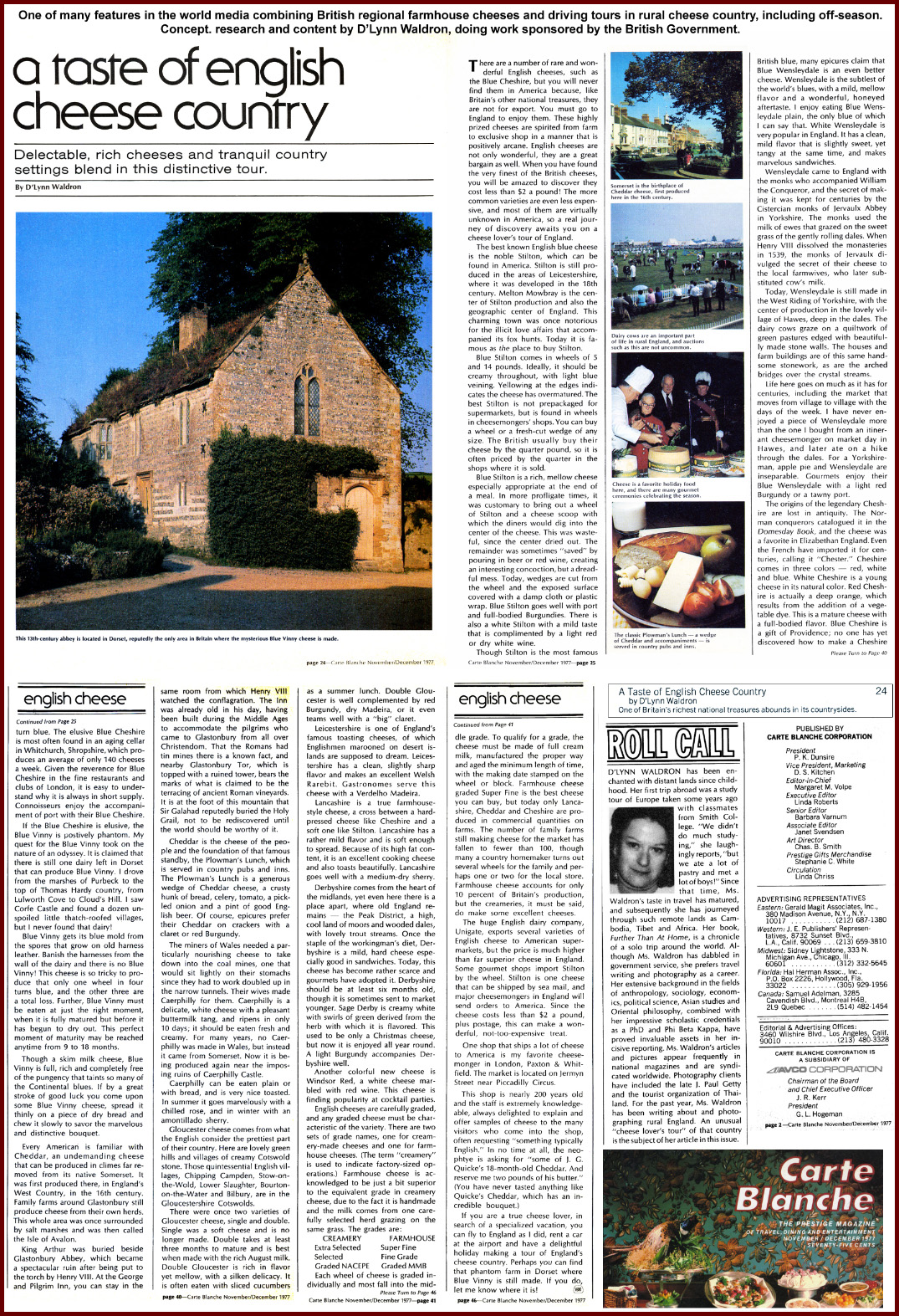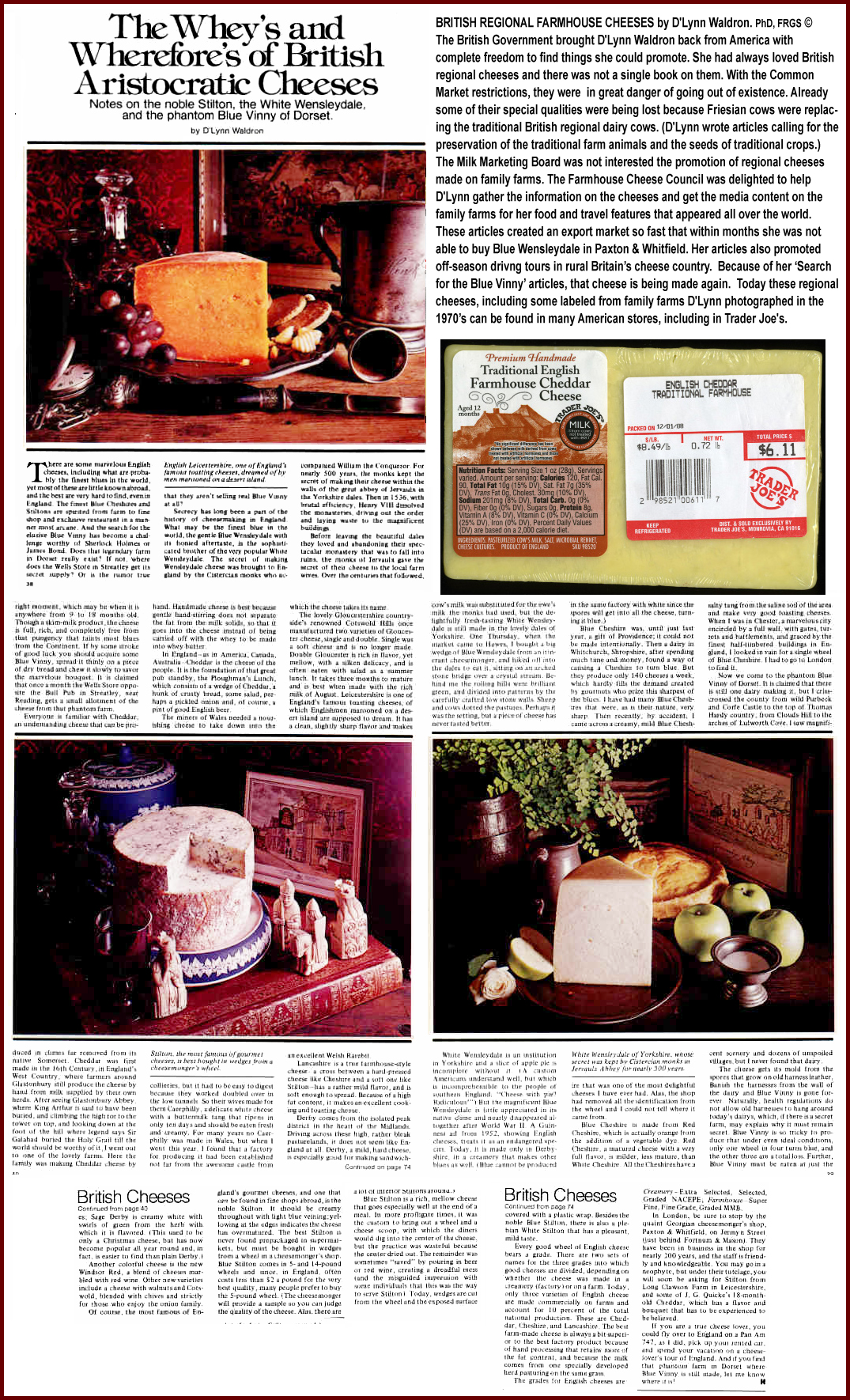 Touring English Farmhouse Cheese Country by D'Lynn Waldron, PhD, FRGS ©
Touring English Farmhouse Cheese Country by D'Lynn Waldron, PhD, FRGS ©
The British Government brought D'Lynn Waldron back from America with complete freedom to find things she could promote. She had always loved British regional cheeses and there was not a single book on them. With the new Common Market restrictions, they were in great danger of going out of existence. Already some of their special qualities were being lost because Friesian cows were replacing the traditional British regional dairy cows. (D'Lynn wrote articles calling for the preservation of the traditional farm animals and the seeds of traditional crops.) The Milk Marketing Board was not interested the promotion of regional cheeses made on family farms. The Farmhouse Cheese Council was delighted to help D'Lynn gather the information on the cheeses and get the media content on the family farms for her food and travel features and that appeared all over the world. These articles created an export market so fast that within months she was not able to buy Blue Wensleydale in Paxton & Whitfield. Her articles also promoted off-season drivng tours in rural Britain’s cheese country. Because of her ‘Search for the Blue Vinny’ articles, that cheese is being made again. Today these regional cheeses, including some labeled from family farms D'Lynn photographed in the 1970’s can be found in many American stores, including in Trader Joe's.
Now, suddenly in 2016, the most famous regional cheeses, such as Stilton, are in danger again. Brexit from the EU will take away the protection the EU has given the use of their names and the requirement that they be made in a specific region, in the traditional way. Without that legal protection, immitation Stiltons can be sold.

 A NEW ARTICLE FROM THE BBC ON BREXIT AND BRITISH CHEESES
A NEW ARTICLE FROM THE BBC ON BREXIT AND BRITISH CHEESES
BREXIT AND BRITISH CHEESES
Britain leaving the EU means cheeses from anywhere can be sold under the famous British names like Stilton because the EU protection of names and the requirement for production in a specified area, and in a specified way, will be lost with Brexit.
Articles on British cheeses and touring cheese country by D'Lynn Waldron, FRGS
http://dlwaldron.com/FarmhouseCheeseCounty.jpg
http://dlwaldron.com/cheeses.html
Article on the BBC web site quoted below
http://www.bbc.com/news/uk-england-36624655
Under current EU law Stilton can only be produced in Leicestershire, Derbyshire and Nottinghamshire, and has to be made with pasteurised milk
Cheddar cheese, Melton Mowbray pork pies, a pint of traditional scrumpy - all foodstuffs that speak of British traditions and are exported across the world.
But are businesses behind some of the UK's finest produce worried about the impact of Brexit on their delicacies?
Richard Clothier's family business is nestled in idyllic Somerset countryside but, like much of the country, things are not so tranquil down on the farm.
As the fall-out from the EU referendum continues, he and his brother Tom are anxiously examining the ramifications of the vote.
Their business is the biggest exporter of Cheddar cheese to France and now Richard is looking for positive signs in a volatile marketplace.
While admitting he was "shocked" by the results, he now plans to hold the Brexiteers to their word and ensure trade is not affected.
"I think what we need now is a period of political stability - we don't need any infighting," he said.
"There's a lot of work to do. Everyone needs to work together because there are some really important challenges coming up for all of us."
Richard Clothier worries how the UK's exit from the EU could affect trade with important customers on the continent
The same concerns are shared by Matthew O'Callaghan, chairman of the Melton Mowbray Pork Pie Association, a body protecting the interests of the famous East Midlands pastries.
He also leads the UK Protected Food Names Association, which includes local delicacies such as Arbroath Smokies, East Kent Golding hops, Stilton cheese and Pembrokeshire Early potatoes that are given special status to preserve traditional or specialist methods.
Protection of food names will be lost and cheap immitations can be sold
• Under EU law there are several ways to protect the heritage of famous foods made traditionally or tied to particular locations
• Traditional Speciality Guaranteed (TSG) means the recipe or method of production has to be very specific
• Protected Geographical Indication (PGI) means the recipe or method is protected and it has to be carried out in a specific location
• Protected Designation of Origin (PDO) status means it also has to be made with ingredients from a certain geographical area
• Examples include Parmesan Reggiano cheese, Parma ham, Stornoway black pudding and Champagne
However, the legislation protecting these foods comes from the EU's Protected Foods Name Scheme, which he fears could be forgotten about in the post-EU political upheaval.
"We have some very worried members, and there's a lot of concern about what happens now," said Matthew.
"You don't have to be a member of the EU to be protected - for example, Colombian coffee is protected - but it has to be a reciprocal arrangement. They protect our products if we protect theirs.
"We will need specific legislation to protect iconic products in the UK and if we want to protect them in the EU, and my fear is that it's going to get lost in everything else that's being discussed."
Unsurprisingly, producers of specially protected food and drink are worried that leaving the EU could make it easier for others to make cheaper versions of cherished cuisine.
Philip Cranston is one of 20 butchers allowed to make genuine Cumberland sausage, which has been protected since 2011.
He said he expects the UK government to carry out similar protections to stop imitators.
"I'd be shocked if it was let go and the process to produce the traditional sausage was opened up for everyone to make," he said.
Foods with Protected Designation of Origin
Bramley apple pie filling
Cumberland sausage
Cornish pasty
Anglesey Sea Salt
Cumberland sausage has a distinctive shape and flavour
'Temporary foreign workers from Eastern Europe EU essential for food harvesting'
'Impossible to recruit harvesters in UK'
Adrian Barlow, chief executive of English Apples and Pears, said losing migrant workers from the EU would harm heritage fruit producers, as well as larger scale orchards.
"Apples and pears are harvested by hand and seasonal workers are required for this," he said.
"Despite enormous efforts by growers, government departments and job centres, it has proved impossible to recruit from the UK any more than a small proportion of the numbers necessary. In short, the British are not prepared to undertake this type of work. Consequently, almost all seasonal workers are from abroad, and at present, mainly from eastern Europe.
"The UK apples and pears sector requires about 12,000 seasonal workers per annum. Unless they can be recruited from abroad, many growers will be forced to cease production which will damage local businesses, local economies, the national economy and deprive consumers."
Matthew O'Callaghan agrees, and thinks the loss of food name protection could see much-loved foods disappear or be replaced by inauthentic replicas.
"It protects jobs, it protects crafts and it benefits the public," he said.
"If the legislation disappeared I think we would get imitations, we would get cheaper products, and they would lose their links with their places of origin."
The future of fruit growing in the UK faces uncertainty, according to the chief executive of English Apples and Pears
A spokesman for the Department for Food and Rural Affairs (Defra) said any changes from Brexit would not come in immediately, and discussions would need to be held about any new protections.
Like in many areas of post Brexit life in the UK, the question of what happens next does not look like it will be answered any time soon.
For people like Richard Clothier, though, there are bills to pay and time is of the essence.
"Disruption in trade just isn't an option for us."


